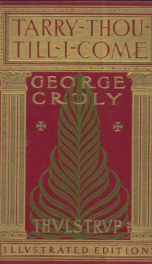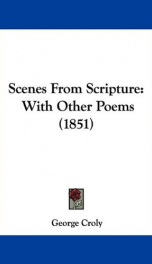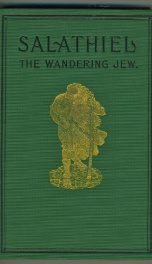the poetical works of the rev george croly

Purchase of this book includes free trial access to www.million-books.com where you can read more than a million books for free. This is an OCR edition with typos. Excerpt from book: NOTES. Note 1, page 6. " you should have seen him in the Campus Martius." The Roman elections were conducted with an order and dignity that might make us look to a higher origin than Italian barbarism. The Consuls, as the first officers of the state, were chosen with peculiar solemnity. The freemen of Rome were assembled in the Comitia Centuriata, in the Campus Martins, by notice given seventeen days before; and the names of the candidates were declared before the notice. The ceremony was consecrated by religious observances ; the auspices were taken; and prayers said by the Consul, followed by the augur ; the business then opened in an address from the Curule chair, and the classes proceeded to vote by ballot. It was the peculiar and honourable distinction of Cicero's VOL. II. N election, that, when the people came up with their ballots in their hands, they yet chose him by acclamation. The form of those elections assists the supposition of a Northern origin of Rome. The magistrate was chosen like the king of a German or Scythian tribe. The people marched to the ground in military array, under military banners; and the Consul, their general in the field, was their president in the Campus Martius. The warlike spirit of this array is clear ; for the reason of holding the Comitia without the walls, was the law prohibiting the assemblage of an army within the city. The stately decorum of those proceedings puts to shame the extravagance of our modern hustings. But human nature has, probably, been always the same; and the popular suffrage was Solicited in every mode that inflames the passions, or seduces the cupidity of the multitude. Our election reserves its effervescence for the hustings; the Roman election was in full, and often guilty, activity, for ten years befor...
Info about the book
Author:
Series:
Unknown
ASIN:
B005GEE4XO
Rating:
4.5/5 (2)Your rating:
0/5
Languge:
English
Users who have this book
Users who want this book
What readers are saying
What do you think? Write your own comment on this book!
write a commentGenre
if you like the poetical works of the rev george croly try:
Other books by this author
Do you want to read a book that interests you? It’s EASY!
Create an account and send a request for reading to other users on the Webpage of the book!





